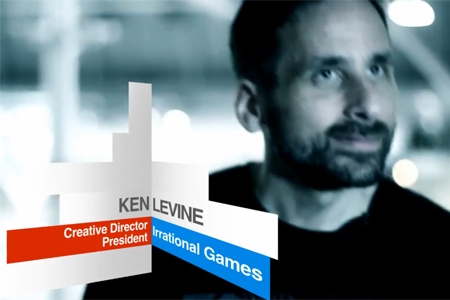BioShock’s Ken Levine Talks About Auteurship, Editing and More. Oh Levine <3
Ken Levine spat about his role in directing the BioShock mothership. He sees himself not as an auteur, but more of an editor. And the creative lead. Definitely the creative lead.
When it comes to the development behind BioShock 1 and BioShock Infinite, Irrational Games studio head Ken Levine described his role as that of “editor of a magazine … but I’m also a writer for the magazine,” putting things into terms that my word-addled brain could understand. “I believe more in editorship. Auteur sounds like you do everything,” he began, making a point to preface his following description with a nod to the other 100-ish folks employed at his Massachusetts studio.
That aside, Levine was clear that his role on Infinite is absolutely that of creative lead, not just creative oversight. “This is my game. And I love the fact that we sit down and chat with each other [Levine and other game devs outside of Irrational], but at the end of the day … this thing’s gotta be my decision.”
When it came to the translation of BioShock 1 from game to film, however, Levine’s role changed — even though he had been creative lead (head editor?) during the game’s development. “If I were to make a game that was based on somebody else’s franchise, you need somebody there who’s going to say, ‘This is true to the franchise, this isn’t true to the franchise.’ So that was more my role in the film,” he explained.
It’s his belief that the film is now in capable hands, even without his direct supervision. “Unless for some reason I decided I’m gonna go be a screenwriter or something, but then that’s a particular job and I have a different responsibility there, which is writing a script instead of the guy who protects the franchise and makes sure the film is true to the franchise.”
While we were on the subject of films, I prodded Levine for any more info on the infamous “Revenge of the Jedi” scene in BioShock Infinite and its origins in a canned Irrational Project. Unsurprisingly, Ken was reticent to say much. “There’s a reason we didn’t proceed with it. From our studio’s perspective it wasn’t the right project for us at that time. And we sort of fell in love with the idea of doing this — with the BioShock world,” he allowed. “But I can’t talk about what it is,” he concluded with a smile.
I think what he’s saying is interesting, and definitely delves into the concept of auteur theory especially when it comes to movies. Video games are much like movies in the sense that it’s such a collaborative effort that it seems fair to make the argument that they are far and above the product of one man’s vision. Of course people who defend auteur theory then retort that it is still a guiding principal that oversees everything, et cetera. Smarter minds than myself have discussed it, I just think it’s neat that such a hotly debated topic in the cinema comes up here in video games at all.
Oh Levine.




